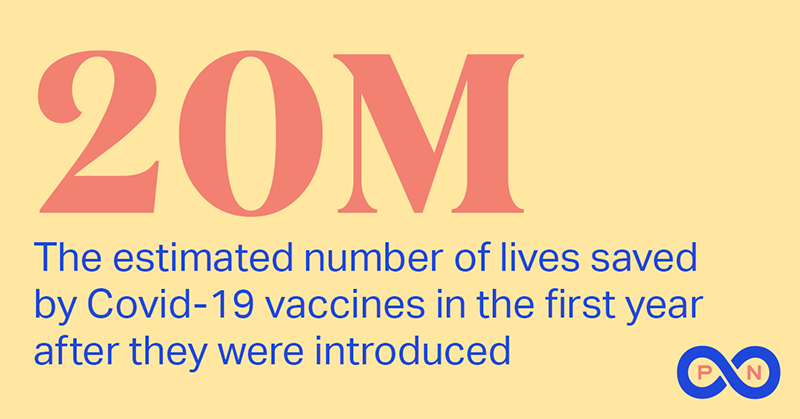Volcanoes are erupting in The Philippines, but on-fire Australia received some welcome rain. The Iran war cries have been called off and The Donald’s military powers are about to be hamstrung by the Senate. Meanwhile, his impeachment trial is starting, and we’re all on Twitter for a front-row seat.
What Could Go Right? The comma after Roe
The story of abortion rights in the United States is still being written. We all have a say in what comes next.
This is our weekly newsletter, What Could Go Right? Sign up here to receive it in your inbox every Thursday at 6am ET. You can read past issues here.
The comma after Roe
There are metrics of progress that are “safely” nonpartisan: a flourishing economy, personal happiness and well-being, low crime, better public health. But then there are things that we have to make a personal call on when writing this newsletter, and one of those is abortion. So while we write from a pro-choice perspective today, it is without malice or disrespect for those who disagree with us, whom we understand are coming from their own ethically formulated position. With emotions running high right now, we’re heeding Substacker Bari Weiss’ measured The Post-Roe Era Begins, where she writes, “We know that it’s chic these days to write off virtues like civility and decency and humility and grace. We believe those things are the only way forward.”
By all means, let’s get involved in the democratic process. Let’s not contribute to an increasingly volatile environment by, for example, sharing the home addresses of the Supreme Court justices on social media. The Progress Network (TPN) Member Matthew Yglesias has great, pragmatic suggestions for how to do the former here. One spoiler: “Most people are more open to being persuaded by peers and family members than by politicians and pundits, so your part-time amateur political communications work has real power,” he writes. (But there’s a strategy for how to do it well. Yglesias will tell you about it.)
After 50 years, abortion itself has gone back to the democratic process. Many have referred to Justice Ruth Bader Ginsburg’s worry that the Roe v. Wade decision was too “swiftly shaped,” eventually proving to be unstable and suspending the debate around abortion rights, essentially freezing American public opinion on the matter in the 1970s. Pro-choice and pro-life sides are on a journey to change hearts and minds now. The debate has reopened.

What’s going on now and correcting confusion
You can see our list of the states with trigger laws and those that will restrict abortion access to earlier than 24 weeks, the standard Roe set, here. Some updates to that list:
- Abortion is still legal in Michigan, but things may change, and upcoming elections there could be decisive.
- It is still legal in Kansas as well, and voters will decide whether to keep it that way or not in August.
- It is currently illegal in Wisconsin based on an 1849 law that went into effect when Roe was overturned, but that law is not currently being enforced. In West Virginia, too, a 19th-century law criminalizing abortion is now active; lawmakers aren’t in a rush to update it.
- Things aren’t settled yet in the courts of Arizona, Louisiana, and Florida. Lawsuits have been filed in Mississippi, Idaho, and Utah against those states’ trigger laws.
There are currently no laws prohibiting out-of-state travel to seek an abortion. Justice Brett Kavanaugh suggested in his concurring opinion on Friday that women doing so would be protected by the constitutional right to interstate travel, although some states may try to test that in the future.
Abortion pills are also still legal. Nineteen states do have restrictions in place around them that prevent their prescription via telemedicine, despite Attorney General Merrick Garland coming out swinging that the Food and Drug Administration’s rules regarding this—which allow the abortion pill Mifepristone to be distributed by mail as of December 2021, a shift in policy we can thank pandemic lockdowns for—take precedence over the states’. GZERO Media has a good explainer of the likely upcoming fight over abortion pills.
There is a lot of worry out there that the Court will “come for” same-sex marriage, interracial marriage, or contraception access next. We’ve discussed in previous editions why we don’t think this will happen—for one, support for the first two is very high across the American public—and judging by what the justices wrote themselves in Friday’s decision, only Justice Clarence Thomas was interested in revisiting any of them. “Roberts didn’t even want to strike down Roe; Kavanaugh said explicitly that this ruling should not cast doubt on those precedents. Even Thomas himself conceded there are other constitutional defenses for those rights,” explained independent politics reporter Isaac Saul. Plus, the Court has also already announced the next cases they’ll consider this year, and none of those are on the docket.
Beyond the bans
We vehemently disagree with the further criminalization of Americans with laws that would punish women and abortion providers. As Judge Victoria Pratt told us on the What Could Go Right? podcast, “we’re criminalizing the people that we’ve already been penalizing—the poor, the marginalized, the abused at our lowest rungs of society. . . . Instead of creating a space where we’re actually dealing with the social ills that make many of these women need to exercise their right to have an abortion, we’re now going to find ways to once again put them in our criminal justice system.”
It’s a great time to start the conversation to address those ills. There are folks on the pro-life side of things that back what they term a “pro-life culture” whose values would necessitate redressing them. As pro-life activist David French—whom you may recognize from two newsletters ago on guns—wrote on his Substack, “the commitment to life carries with it a commitment to love, to care for the most vulnerable members of society, both mother and child.” (What he says about the disquiet he feels around the levels of animosity in some parts of pro-life red America is also worth reading.) Regardless of politics, we can encourage a solid sexual education along with the widespread use of birth control, emergency contraceptives, and pregnancy tests to both prevent pregnancy and catch unwanted pregnancies early. contraceptives, and pregnancy tests to both prevent pregnancy and catch unwanted pregnancies early.
We do have to wonder about where in the story we are when it comes to abortion rights in the United States, because it doesn’t seem like a period at the moment. How much money and effort is about to be poured into the pro-choice movement, which was lulled into a complacent sleep by Roe for years? In the long run, will it eventually lead to a more stable state of affairs?
Commentator David Frum, comparing the post-Roe reaction to Prohibition, has one argument for that outcome. Substacker Sarah Haider has another. “People will now face the consequences of their own politics,” she writes. Frum echoes, “Abortion politics is about to transition from being the conservative ideologue’s proof of purity to the Republican politician’s most vexed and intractable quagmire. We may all be surprised at how rapidly the politicians start looking for some escape.” We’re already seeing signs of this in Arkansas, where you can’t help but wonder, reading this, if the governor didn’t think the law he signed in 2019 to ban abortions without exceptions for rape and incest would actually ever go into effect.
Meanwhile, Israel nixed their requirement that women appear in front of a committee in order to receive an abortion, and made abortion pills available. Germany is moving to decriminalize abortion.
As for the rest of the unwritten story here in the States, we’ll end with words from Yglesias. “Expect fights to play out in every state, and try to stay aware and active,” he says. “There isn’t going to be some deus ex machina win here, just a brutal series of state-by-state, bill-by-bill struggles. And the effort each of us put in as individuals is going to matter.”
Living in a vaccine paradise
Malaria is a global killer for young children and pregnant women. Last year, a new, modestly effective vaccine was added to the arsenal of weapons in the fight against it. We ran an interview at the time with an expert who wasn’t sure if we’d eradicate malaria by 2040 or even 2050. This year, we have a new vaccine with an efficacy of 77%, the first to meet the World Health Organization target of 75%. Even better, “The Serum Institute of India, the world’s largest vaccine manufacturer, stands ready to deliver at least 200m doses annually—a scale necessary to beat malaria.” This looks like a game changer.
We’ve had naught but failure on developing a vaccine for Respiratory Syncytial Virus (parents will know it by its acronym RSV) since the 1960s. Soon we’ll have several working ones, given news this month from GlaxoSmithKline and Pfizer. In 2019, RSV killed more than 100,000 children worldwide.
Before we go

Did you see this bonkers video of a Montana house collapsing into the Yellowstone River? Well, it’s not the only place where dwellings are falling into bodies of water. In Puerto Rico, homes are being lost to the sea due to erosion and flooding. This software company is trying to give a heads up of where that may happen, up to 30 years into the future. It’s like “Google Maps on steroids.”
Japan is coming through with a Pride Month win in the nick of time. While the country still does not recognize same-sex partnerships, Tokyo said “screw that” and will start to do so in November. Happy Pride!
Kazakhstan voters have backed a series of democracy-strengthening reforms and abolished the death penalty there.
Last but not least, is Indonesia the most amazing development story on Earth?
Below in the links section, $100 human genomes, car-free cities, sunsetting gas stations, and more.

Progress, Please
(Found good news? Tweet at us @progressntwrk or email.)
Other good stuff in the news ⛽
Environment:
- How to rewild a country: the story of Argentina | The Guardian
- One in five county councils have embraced rewilding on public land in Great Britain | The Guardian
- Texas plans to place charging stations for electric cars every 50 miles on most interstates | The Texas Tribune
- The UK’s largest carbon capture project will turn CO2 into baking soda | New Scientist
- A new state park trail in Tennessee is made up entirely of illegally dumped tires | EcoWatch
Science & Tech:
- A $100 genome? New DNA sequencers could be a ‘game changer’ for biology, medicine | Science Magazine (why this matters)
- New lab to simulate 200 mph hurricanes in quest to make storm-resistant homes | National Geographic
- CRISPR, 10 years on: Learning to rewrite the code of life | The New York Times
- Scientists harness light therapy to target and kill cancer cells in world first | The Guardian
Politics & Policy:
- People hate the idea of car-free cities—until they live in one | Wired
- Now taking smart ideas for what to do with our future abandoned gas stations | Grist
- China to ban new heavy industrial projects in key zones | Reuters
- Canada launches interest-free loan program for eco-friendly home upgrades | Storeys
- Now canceled: student debt of 200k borrowers who say they were defrauded | Politico
- Financial literacy required to graduate high school in Michigan | Chalkbeat
Covid & Public Health:
- Moderna booster candidate shows strong response against Omicron subvariants | Reuters
- Could a vaccine for cancer be within reach? | The Spectator
- Why nuclear power is good for public health | Neo.Life
- Equatorial Guinea has eliminated ‘sleeping sickness’ | World Health Organization
Society & Culture:
- Chicago police are no longer allowed to chase people on foot just for running away | NBC News
- These Nigerian content creators want to change perceptions about albinism | Minority Africa
- Inside the push to diversify the book business | The New York Times
- To protect people with addiction from discrimination, the Justice Dept. turns to a long-overlooked tool: the ADA | Stat
TPN Member originals 🧠
(Who are our Members? Get to know them.)
- The end of Roe means we need a new civil right to privacy | Danielle Keats Citron
- The Supreme Court has given away its legitimacy | James Fallows
- Biden 2024? America needs to know now | Matthew Yglesias
- Washington must invest in multilateral institutions, not infrastructure | Charles Kenny
- The perils of shaping a recalcitrant world | Andrew J. Bacevich
- It’s time to talk about peace in Ukraine | Robert Wright
- Here’s what the (likely) upcoming US recession will look like (probably) | James Pethokoukis
- The Cold War tells us that the Ukraine war might accelerate the green transition | Ted Nordhaus
- How to stop dating people who are wrong for you | Arthur C. Brooks
- The world’s first energy crisis | Jason Bordoff
- Do the politics of class and race stand in tension? | Yascha Mounk
- The death of conversation | Jonathan Haidt
- Republican malignancy | Diane Francis
- How depoliticizing the US health response will save lives | Ian Bremmer
Department of Ideas 💡
(A staff recommendation guaranteed to give your brain some food for thought.)
How we got bipartisan gun reform | Persuasion
After the Supreme Court expanded gun access, can recent legislation be a model for bipartisan compromise on urgent issues?
Why we picked it: For its cautious optimism that if we can get something done on as difficult a front as gun safety, then compromise on other issues is possible, too, and the reminder that responsible governance “is almost always boring, that it always requires persuasion and compromise, and that positive changes must often come in small doses.” —Emma Varvaloucas
Until Next Time
Point your awe at this guy’s “unskilled labor.” 😮👇


